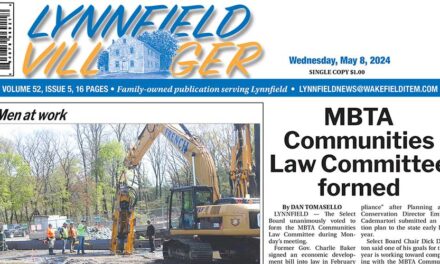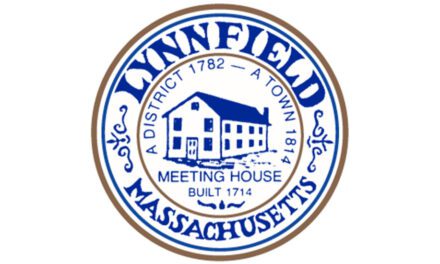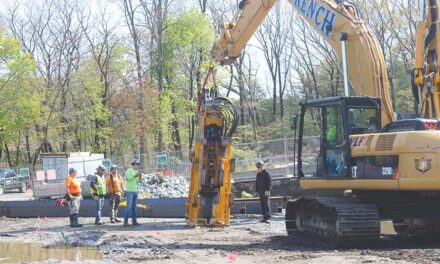Current fiscal year should end in the black
Published in the December 14, 2016 edition
By MAUREEN DOHERTY
LYNNFIELD — The town officially began the Fiscal Year 2018 budget season last Wednesday at its annual budget summit.
Department heads and committee leaders met for a roundtable discussion at the Senior Center on the town’s fiscal health in the current fiscal year, as well as their anticipated needs as they begin to finalize their operating and capital expense budgets for the FY18.
“We are really into period of very low growth in our revenue, and that is going to be reflected in the budget going forward, so I am asking you at this point to be very conservative in your budgets,” Town Administrator Jim Boudreau informed the town’s leaders in his overview of the FY18 budget planning process. “I am not anticipating that there is going to be a lot of opportunity to add personnel in fiscal 18 on the operating budget,” he said. Due to the state’s budget woes, he will be level-funding anticipated state aid.
However, the news isn’t all bleak. Boudreau said the town’s fiscal health continues to be “excellent” while the town’s Free Cash reserves will enable the “robust” capital planning program begun over the past few years to continue.
Over the course of the next four months, the operating and capital budgets will be analyzed by both the T.A. and the Finance Committee, and presented to the Board of Selectmen, where they will be scrutinized yet again by the selectmen and the public at a series of public hearings this winter leading up to the annual Town Meeting in April.
The School Committee will review and approve the School Department’s budget at its own public hearing and make presentations seeking the support of the selectmen and FinCom. Throughout the process, FinCom liaisons will meet with each department while all departments and committees are given the option to also meet in front of the full FinCom to further discuss their budgets.
Boudreau reported that it is still early in FY17 in terms of revenues received by the town, but he believes the town is in good shape. “We have only one quarter of our taxes in. …There is nothing to show that revenues will be a problem in fiscal year 17,” he said, adding that motor vehicle excise tax receipts won’t be known until the second half of the fiscal year.
Boudreau also expects to finish FY17 “in the black” after the town squared up some accounts at October Town Meeting and found additional funds for the DPW to put toward field maintenance. “We are aware that the schools have some SPED move-ins,” he said, which will result in an increase in expenses for the School Department, however, Boudreau added, “there is nothing at this point that jumps out that says we will have major problems on the expenditure side.”
“Fiscal 18 is another issue altogether. The state has started their process of setting the state revenue phase for FY18. The economists are saying that because the incoming president has not completely laid out his economic package that the outlook of the national economy is still uncertain and cloudy,” Boudreau said.
“They are projecting between 2 1/2 and 5 percent growth in the state budget. That sounds like a good figure, but last year in December the state revenue figure was $26.86 billion. It has been revised down to $26.056 billion, or $800,000,000 less that it was last year,” he said. Boudreau explained this means that even if state revenues “go up 3 percent of that lower number, we are still not back to the number that the state started with last year.”
How will this affect Lynnfield’s budgeting process? Boudreau told the department heads that he will be taking a conservative approach to the FY18 budget beyond contractual obligations and that any requests for additional staff will be closely scrutinized.
“At this point we are not projecting into our revenue any additional state aid for fiscal year 18. That’s one of our three main sides of revenue – state aid, taxes and local receipts,” Boudreau told the department heads.
“We are holding state aid level. We are projecting a modest increase in our local receipts. Our meals tax continues to be strong; we expect that to go up. We are projecting, obviously, a 2 1/2 percent increase in our local taxes,” he said.
New growth trends downward
As anticipated, the town’s new growth estimates are also trending downward to the new normal.
“Our new growth level will go down from an estimated $500,000 in fiscal year 17 to $300,000 in fiscal 18. That is trending down from fiscal 15 when it was over $2 million. That ‘MarketStreet effect’ has now basically gone away as new growth on our budget. We anticipate growth between $300,000 and $500,000 (annually) going forward.”
This boils down to “very modest increases in revenue for fiscal 18. I do not anticipate budgets beyond contractual increases. Any new requests for staff is going to be very closely scrutinized for affordability and to make sure it is sustainable going forward,” Boudreau said while the town also deals with rising costs for SPED, field maintenance, health insurance and pensions.
After the town has invested “in the neighborhood of $8 million so far” to construct its playing fields and playgrounds, he stressed the importance of the DPW creating a field maintenance plan that will ensure the protection of that investment.
Health, pensions up 5-10%
“Health insurance is projected (to increase) between five and 10 percent, which is between a quarter of million and a half of a million dollar increase, which eats up more than one-third of what I’ve projected for local revenues,” Boudreau said. Similar increases of five to 10 percent for pension plans are also anticipated, he said.
There was a silver lining in this fiscal news. “On a happy note, the fiscal health of the town overall is excellent. Our reserve positions continue to improve. Our reserve fund balance on the audit continues to go up, which is a sign of economic strength and viability that the bonding companies look at,” he said.
He anticipates continuing the town’s “very aggressive capital program for fiscal year 18. We do have sufficient Free Cash reserves to fund a very robust capital program. We want to continue that as long as we possibly can. But the operating side, there is not going to be a lot of room for growth beyond what is contractually required,” Boudreau concluded.
Police
Police Chief David Breen reported that a new Civil Service list of police officer candidates will be coming out from which his department will select a candidate from town who has either attended the Police Academy or would attend the next academy in January. Getting a new officer on duty will greatly assist in reducing his department’s overtime budget, which has been affected by a one-year absence of a department member injured in the line of duty. Breen is also hopeful that this officer will soon be medically cleared to return to duty.
The police chief said the only increase he anticipates in his operating budget are those required by contractual raises. Breen added the major capital budget requests for the Police Department in FY18 will total about $124,500 for:
• $78,000 for two Ford Explorer police vehicles, with electronics ($39,000 each) to replace two 10-year-old vehicles with over 100,000 miles each. One retired cruiser would be used for police details; he hopes to trade in the other.
• $39,000 to cover the second year of a five-year fiber optic upgrade project servicing radio equipment used by both the Police and Fire Departments. This is a shared expense between the two departments, Breen said.
This upgrade involves “running fiber optic lines to both repeater sites at Strout Avenue and Knoll Road from Salem Street and also replacing equipment at Salem Street site,” Breen said.
• $7,500 for a Police Department computer server. This is part of a two-year project to replace aging equipment, Breen said. Their current server was formerly used by the school department, which had taken it out of service six years ago. Upgrading it will give LPD a back-up server and be less vulnerable to hacks that have led to ransom requests by criminals who hold such systems hostage, Breen said. He noted that Tewksbury’s Police Department was a victim of such a scheme and had paid the ransom.
School Department
Superintendent of Schools Jane Tremblay acknowledged that this has been a difficult year for the School Department. “Moving forward to the 2017-18 budget we are looking to hold on to what we have and not add anything,” she said.
In addition to increased SPED costs, Tremblay said the School Department is dealing with an unprecedented number of requests for medical or maternity leaves of absence – upwards of 22 in 2017–18. By comparison, she said, they typically have only eight to nine such requests each year.
Conservation agent to retire
Conservation administrator Betty Adelson announced that she will be retiring in the fall of 2017, therefore, the only additional expense she plans to request within her department’s operating budget is an increase in the salary line item for an increase in the hours her assistant, a wetlands scientist, works “to help with the transition and hopefully eventually take my place.”
Adelson also had a bit of unusual news. She recently met with a field producer and a cameraman from WCVB-TV’s local magazine show, “Chronicle,” in the Kallenburg Quarry of the Bow Ridge Reservation. She took them to what is known as “Skull Rock” where she was interviewed for an upcoming segment based on the book and travel guide called “Weird Massachusetts.” It will air sometime next month.
Adelson explained that many years ago, someone had painted a series of skulls on the granite inside the quarry. The fact that she would become famous for the quirkiness that is this story drew a round of laughter from the other department heads during what is ordinarily a rather dry discussion on municipal budgeting.
Details of the preliminary budget requests from the town’s other department heads will appear in next week’s Villager.




